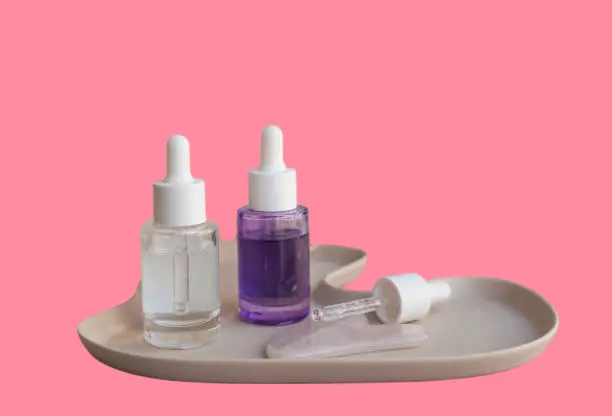Skincare requires careful knowledge of how to combine products to avoid skin irritation or loss of the effectiveness of the ingredients.
Some active ingredients may interact negatively when combined, leading to adverse results instead of the desired benefits. Therefore, it is important to know which combinations should not be used together.
First: Retinol with Vitamin C

Both are considered powerful anti-aging ingredients, but using them together can cause skin irritation, as:
- Combining them can increase sensitivity and redness.
- It is best to use vitamin C in the morning and retinol at night.
- Combining them reduces the effectiveness of each.
Second: Exfoliating Acids with Retinol
Such as AHA and BHA acids, which are not suitable for simultaneous use with retinol, as:
- Their combination causes dryness and peeling of the skin.
- It may weaken the skin's protective barrier.
- It is best to separate them by at least two days.
Third: Vitamin C with Niacinamide
Although both are beneficial ingredients, their interaction may cause undesirable results:
- Mixing vitamin C with niacinamide may reduce its effectiveness.
- It may cause irritation to sensitive skin.
- It is best to use one in the morning and the other in the evening.
Fourth: Benzoyl Peroxide with Retinol
Both are used to treat acne, but combining them causes excessive dryness:
- It may lead to redness and peeling of the skin.
- Benzyl Peroxide reduces the stability of retinol.
- It is best to use benzoyl peroxide during the day and retinol at night.
Fifth: Exfoliating Acids with Vitamin C
Combining them may increase the pH level of the skin, which:
- causes a burning sensation and irritation.
- Vitamin C loses its antioxidant properties.
- Vitamin C should be used in a separate routine from acids.
Sixth: Retinol with Salicylic Acid
These are powerful ingredients for treating acne, but when combined, they weaken the skin by:
- Causing extreme dryness and peeling.
- Increasing the risk of skin infections.
- It is best to choose one of the two ingredients according to your skin's needs.
Seventh: Niacinamide with Alpha Hydroxy Acids

This combination may reduce the effectiveness of niacinamide by:
- Causing irritation in sensitive skin.
- Reducing the absorption of niacinamide.
- It is best to use acids at night and niacinamide in the morning.
Eighth: Chemical and Physical Peeling Products
Combining them causes skin fatigue and damage to the surface layer, as they:
- Lead to invisible microscopic wounds.
- Increases sensitivity to the sun.
- It is recommended to use one type of peel per week.
Frequently Asked Questions About Unsafe Products to Use Together
Can Retinol Be Used with Acids on the Same Day?
This is not recommended to avoid skin irritation. It is best to alternate between them every other day.
What happens if I use incompatible products together?
They may cause irritation or loss of the effectiveness of the active ingredients.
How do I know the correct order of use for my products?
It is best to start from the lightest to the heaviest, taking into account the type of active ingredients.
Is it recommended to consult a doctor before combining products?
Yes, it is always recommended to consult a dermatologist, especially for those with sensitive or dry skin.
Article Summary
Coordinating skincare products depends on understanding the nature of the active ingredients and how they interact with each other.
Combining them incorrectly can lead to irritation, dryness, or even loss of therapeutic effectiveness. Therefore, it is best to use each ingredient at the appropriate time within a balanced routine to avoid problems resulting from incorrect use of products.